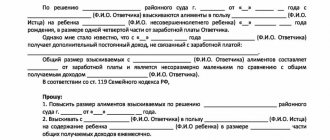When and who pays child support?
Protecting children and providing them with a supportive environment that enables effective intellectual, moral and physical development should be a priority for parents. However, when a family breaks up, the obligation to provide financial support for children is, in practice, more often fulfilled by only one parent with whom the children live. Gloomy statistics suggest that evasion of the responsibility to provide financial support to children is becoming commonplace.
Alimony payments are the obligation of parents to a child or children. Such financial support should be provided by the parent who lives separately after the divorce. The Family Code states that ensuring the interests of children is the primary concern of their parents.
The basis for paying alimony is the fact of blood relationship. The rights and obligations of parents and children arise from the fact of relationship between parents and children, certified in the manner prescribed by law - this interpretation is confirmed by paragraph 29 of the Resolution of the Plenum of the Supreme Court of the Russian Federation No. 16 of May 16, 2021. Art. No. 80 of the RF IC establishes the equal obligation of both parents to support common minor children.
Main aspects:
- Parents can themselves determine the form and procedure for paying alimony; they have the right to enter into an agreement on the payment of alimony in accordance with Art. 16 IC RF.
- If parents cannot independently agree on the maintenance of children under 18 years of age, the amount of alimony after a divorce is determined by the court.
- If payments for the maintenance of the child are not made, the guardianship and trusteeship authority has the right to apply to the judicial authority with a claim for the recovery of alimony for the maintenance of children under 18 years of age from both parents or one of them.
How to apply for alimony forcibly
There are two ways to obtain alimony through the court:
- by filing an application for a court order;
- filing a claim.
Court order
It is possible to collect alimony through a court order if it is possible:
- receive alimony in the form of a share of income;
- do not call witnesses to confirm any facts (establish paternity, for example);
- do without the defendant challenging the decision.
In essence, such an order is a simplified collection of payments, so there should not be any complications complicating the matter (disputes about rights and kinship, the need for alimony by a parent, the location of the defendant in another country, etc.).
The magistrate, to whom the application must be addressed in such cases, makes a decision without summoning the parties. The decision is made by a judge within a five-day period, but can be appealed within 10 days. In this case, you have to file a claim.
If the order does not cause any claims from the defendant, it is used as a writ of execution. When payment rules are violated, alimony may be collected based on this court order.
A court order must be applied to the Magistrates' Court. An application drawn up in writing must contain the following information (based on Article 124 of the Code of Civil Procedure of the Russian Federation ):
- name of the court;
- the name of the claimant, information about his place of residence or location;
- name of the debtor, information about his location/residence;
- requirements and grounds for them;
- proof.
Child support begins to accrue from the day of registration of applications for a court order in the court office.
Claim for alimony
If the debtor challenges the court order, or there are other circumstances that do not allow the issue to be resolved according to a simplified scheme (questions about paternity arise, alimony must be awarded in a fixed form, the payer lives abroad, etc.), you should file a claim with the court for the appointment alimony.
Next, you will learn about which court hears alimony cases.
Jurisdiction
A statement of claim requesting the imposition of alimony obligations, as well as an application for a court order, is submitted to the magistrate's court. In this case , you can go to the court located in the area where the defendant or the plaintiff and the child live .
Documentation
The list of documents required to submit to the court is as follows:
- lawsuit;
- a receipt confirming that the state duty has been paid;
- documentary evidence of the fact that the child lives with the plaintiff;
- documents on registration and divorce;
- child's birth certificate, or certificate of paternity (for persons whose marriage was not registered);
- certificate of income of the defendant.
Filing a claim
Examples of a statement of claim for the collection of alimony can be found both in court and, first, on the Internet. This paper includes:
- name of the court;
- information about the plaintiff (full name, address);
- information about the defendant;
- the cost of the claim, equal to the annual amount of payments;
- description of the situation;
- requirements and grounds;
- list of documents supporting the application.
Procedure
The procedure for applying for alimony is as follows:
- First of all, you need to collect all the documents and make the necessary copies. It is very important to take a certificate of family composition (if possible, not only at the plaintiff’s address, but also at the defendant’s address).
- The second important step is to compile a list of expenses for the child and calculate the minimum amount of child support. The data must have confirmation in the form of checks, certificates, certificates received from other persons, etc.
- If the defendant is not officially employed, it is advisable to provide the court with information about the source of his income so that the amount of alimony in a fixed amount is adequate to the circumstances.
- The verdict that has entered into force must be taken to the office, where, on its basis, you will be issued a writ of execution, which, in turn, is transferred to the bailiffs.
Thus, there are three main ways to collect alimony: agreement, court order and statement of claim. The first of them is based on voluntary consent between the parents, the last two are applicable when it is not possible to draw up an agreement.
What is an agreement between parents
A husband and wife can agree on financial support for a child (alimony) without the participation of the court. In the modern world, no one believes words and promises anymore, so parents should take this issue seriously. To draw up a voluntary agreement indicating what the amount of alimony will be in the event of a divorce, parents need to come to a notary’s office and enter into a written agreement, which will be certified by a notary. If the terms of this document are violated, then in order to compulsorily collect alimony, you will need to go to court.
Amount of alimony
Statistics and legal practice show that in Russia children most often end up living with their mother, so the main question that women ask specialists is how much alimony the father pays during a divorce. The amount of alimony in a divorce for one child will differ from the amount that should be provided for several minor children.
The amount of alimony payments is specified in Art. 81 Family Code:
- per child is entitled to a payment in the amount of ¼ (25 percent) of the income (salary or other income in rubles or foreign currency) of the defendant (father or mother);
- if there are two offspring, the parent must allocate a third of his income for the maintenance of the children;
- 50 percent of income will have to be paid for three or more children.
Based on the financial situation of the parties and exceptional circumstances (lack of suitable housing, serious illness, injuries), the size of the shares may be increased, and in case of low wages and poor health of the payer, the amount of payments may be reduced. To reduce or increase child support, you need to go to court.
Amount of alimony in case of divorce
The amount of payment is determined by the judge. The case is then transferred to a FSSP officer. It is necessary to negotiate with him at an early stage until he blocks the accounts. Typically, information is collected within 30 days, after which the specialist begins collection by all available means if the spouse does not pay the fee voluntarily.
Determination of amount as a percentage
Depending on the number of children, you will need to pay a different amount from your income. In practice this is:
| Amount of children | Cut-off income amount |
| 1 | 25 % |
| 2 | 33 % |
| 3 | 50 % |
| More than 3 | 16% for each child |
It is worth understanding that the amount of income also affects the maximum amount of recovery. If the salary is large enough, then the court may determine payment of up to 75% of the total income. Thus, many nuances affect how much a spouse will have to pay for the support of his child.
Payment in a fixed amount
This method of recovery is prescribed if the spouse has problems with income.
So, when he receives earnings unofficially or does not work, it is necessary to make payments in a fixed amount of money. According to current legislation, this is the subsistence minimum. Today it is 10,181 rubles per child.
Amount adjustments can be made quarterly. If the spouse does not make payments, then the debt accumulates. A FSSP specialist can block existing accounts.
Then the required amount and penalties for late payment will be automatically transferred to the beneficiary. The account cannot be unblocked until the end of enforcement proceedings.
How much alimony should I pay my wife during a divorce?
Article No. 89 of the RF IC explains that spouses are obliged to support each other if they have sufficient means for this under certain circumstances.
Namely:
- if the wife is disabled;
- if the woman is pregnant;
- if the wife cannot work because she is raising a child under three years old;
- if the spouse is caring for a common disabled minor child.
How much alimony to pay to the wife during a divorce under such circumstances can be determined by the former spouses themselves by signing an agreement. Another option is to go to court. Then the amount of accruals in a fixed monetary amount will be determined.
It is worth consulting with a lawyer about the amount of alimony a wife is supposed to pay after a divorce.
Assignment of payments in case of divorce
It is impossible to dissolve a marriage if a couple has minor children outside of court. The petition for divorce may include a request for payment. Even if alimony is not mentioned in the lawsuit, the court will definitely touch on this topic, since the interests of the children come first during a divorce.
For the child and the parent caring for him
In addition, child support can be awarded not only to the child, but also to the parent in whose care he remains. There are a number of reasons for this:
- Disability of the person with whom the child lives;
- Maternity leave . If a child under 3 years of age is left with his mother, who is forced not to work in order to raise him, the father is obliged to pay child support for both of them;
- Caring for a disabled child . With 2-3 degrees, funds are paid until the child reaches adulthood. At 1 – for life;
- Pregnancy . In the case when the spouse, being pregnant, herself filed for divorce.
Package of papers
If you are planning to file for divorce and, at the same time, to collect payments for the child, prepare the following documents for filing a lawsuit for alimony:
- Passport with copies;
- Marriage certificate;
- Certificates of children for whom alimony is planned to be collected;
- Certificate of family composition;
- Certificates of income of the parties;
- State duty receipt;
- Statement of claim asking for divorce and alimony.
The court will not decide the issue of alimony only when the divorcing spouses provide an agreement on the amount and terms of payments, certified by a lawyer.
This video will tell you in more detail about whether and how it is possible to file documents for child support in court against the child’s father:
Procedure for collecting a fine
If a parent obligated to pay child support fails to pay it once, twice, three or more times, a fine may be collected from him. A fine is liability for non-fulfillment or improper fulfillment of obligations. The culprit pays the alimony recipient a penalty in the amount of 0.1% of the debt amount for each day of delay.
To collect a fine for late payment of alimony, you need to contact a bailiff. Next, the alimony arrears will be calculated. If the alimony payment is charged in proportion to all types of earnings and the defendant had no official income, the debt is calculated taking into account the average Russian salary at the time of debt collection. After this, it is necessary to prepare a claim for the recovery of alimony from the father or mother.








